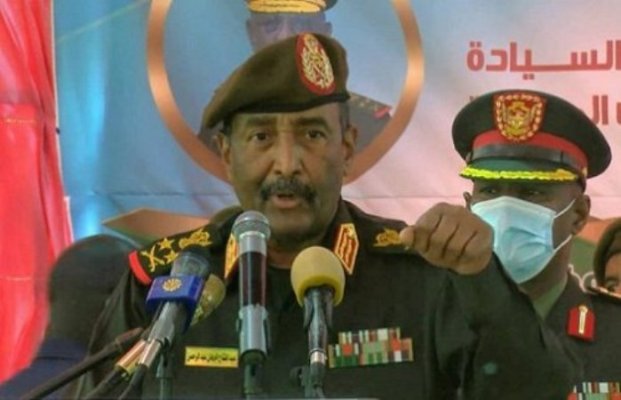Burhan rejects reforming Sudan’s security sector during transitional period
February 12, 2022 (KHARTOUM) – Abdel Fattah al-Burhan, Head of the Sovereign Council and Commander-in-Chief of the Sudanese army, has rejected any reform of the military establishment during the transitional period.
The constitutional document signed by the military component with the Forces for Freedom and Change on August 17, 2019, provides for the implementation of reforms by the army command on military agencies, as part of the required reforms to be achieved during the transition towards democracy.
Also, the Juba peace agreement refers to these reforms saying that a single national army should be formed with a new military doctrine. The deal stressed that the Rapid Support Forces is included in this reform.
In an interview with Sudan Television on Saturday evening, al-Burhan said the aim of the coup against the civilian component was to expand the political base of the transitional period and allow more parties to join it.
He stressed his commitment to implement all that was contained in the constitutional declaration, although it was only signed by the military component and the FFC.
He further accused the FFC of having hostility to the military component and intending to interfere in its affairs.
“No one has a mandate to interfere in the military affairs and no one can talk about reforming or restructuring the military institutions, except for the forces that are chosen by the people through elections,” he emphasized.
He added that all the military establishment agrees on this position “Because they are threatened in their unity, survival and potential”.
To justify his rejection of the reforms related to the army and its militias the head of the Sovereign Council said that the military establishment is “the backbone and the safety valve of this country”
This is the first time that al-Burhan expresses clearly his rejection to implement the security sector reforms, which include the dissolution of the RSF militia and the handover of economic companies to the government.
The FFC requested the transfer of military-economic companies to the government and the end of all the privileges it enjoys since all the army’s budget is paid from the public treasury, including the RSF militia.
The Sudanese army owns a number of holding companies working in the fields of civil industries, agriculture, meat export and mining, in addition to military industries.
Within the framework of economic reforms agreed with the international financial institutions, the transitional government has plans to end tax exemptions and facilities enjoyed by these companies. Also, these reforms include giving the government control of its activities and injecting its income and resource into the state budget.
Until now, the government has no control over the military companies and ignores their assets and financial capacities.
(ST)

